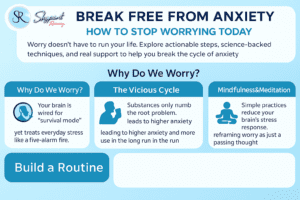Worry doesn’t have to run your life. Explore actionable steps, science-backed techniques, and real support to help you break the cycle of anxiety for good.

Everyone worries. But when it becomes constant, it can interfere with sleep, focus, relationships, and even recovery.
If you’ve been searching for how to stop worrying, the first step is understanding why the mind spirals. Learning how to stop worrying feels impossible when your brain treats every small problem like a five-alarm fire. But here’s something most people don’t realize: worry is a habit, and like any habit, you can change it.
Your racing thoughts don’t define you. They’re patterns your brain learned to keep you “safe,” even though they’re actually making life harder. The good news? You can teach your mind new tricks, starting today.
Why Do We Worry? Understanding the Roots of Anxiety
Your brain evolved to keep you alive, which means it’s constantly scanning for threats. Thousands of years ago, this hypervigilance helped humans avoid predators and survive harsh conditions. Today, that same system treats a work deadline like a charging tiger.
Worry becomes problematic when it shifts from occasional concern to constant background noise. You might find yourself creating worst-case scenarios about situations that haven’t happened yet. Maybe you replay conversations, analyzing every word for hidden meanings. Or perhaps you lie awake at night thinking about all the ways tomorrow could go wrong.
Addiction and anxiety share a complicated relationship. Many people discover they started using substances to quiet their anxious thoughts. Alcohol might have made social situations feel manageable. Prescription pills could have provided temporary relief from panic attacks. But what starts as self-medication often becomes its own problem.
Common anxiety triggers include major life changes like starting a new job, relationship conflicts, financial stress, and health concerns. For people in recovery, additional stressors might include rebuilding relationships, finding new social circles, or learning to cope with emotions without substances.
The Vicious Cycle of How Worry Fuels Addiction
Picture this: you feel anxious about a work presentation, so you have a few drinks to calm your nerves. The alcohol works temporarily, giving you confidence and easing the physical symptoms of anxiety. Your brain remembers this “solution” and suggests it again next time anxiety strikes.
Over time, substances stop being effective anxiety management tools. Alcohol disrupts sleep patterns, making you more emotionally fragile. Stimulants can trigger panic attacks. Even marijuana, which many people use for anxiety, can increase paranoid thoughts with regular use.
The withdrawal process often intensifies anxiety symptoms. Your brain’s chemical balance is disrupted, leaving you feeling more vulnerable to worry and panic than before you started using. This creates a dangerous cycle where anxiety drives substance use, which worsens anxiety, which drives more substance use.
Breaking this pattern requires addressing both issues simultaneously. You can’t effectively manage anxiety while actively using substances that disrupt your brain chemistry. Similarly, maintaining sobriety becomes much harder when untreated anxiety makes every day feel overwhelming.
Mindfulness and Meditation Are Your Secret Weapons Against Worry
Mindfulness for anxiety works by changing your relationship with thoughts. Instead of fighting anxious thoughts or trying to eliminate them, mindfulness teaches you to observe them without judgment. Think of your thoughts like clouds passing through the sky rather than storms you need to battle.
Research shows that regular meditation practice actually changes brain structure. The amygdala, which triggers fight-or-flight responses, becomes less reactive. Meanwhile, the prefrontal cortex, responsible for rational thinking, gets stronger. These changes happen relatively quickly, with some studies showing benefits after just eight weeks of practice.
Start with simple breathing exercises. Find a comfortable position and focus on your breath for five minutes. When your mind wanders to worries, gently redirect attention back to breathing. You’re not trying to stop thoughts completely; you’re building the mental muscle that helps you choose what deserves your attention.
Progressive muscle relaxation offers another entry point into mindfulness. Tense and release each muscle group, starting with your toes and working up to your head. This technique helps you recognize the difference between tension and relaxation, making it easier to catch anxiety in your body before it overwhelms your mind.
Build a Worry-Busting Routine
Anxiety thrives in chaos but struggles against consistent routine for mental health. When your days follow predictable patterns, your nervous system can relax instead of constantly preparing for the unknown. Structure doesn’t mean rigid scheduling; it means creating reliable anchors throughout your day.
Morning routines set the tone for everything that follows. Maybe you start each day with ten minutes of journaling, a healthy breakfast, and a brief walk. Evening routines help your brain wind down naturally. Perhaps you put away screens an hour before bed, do some light stretching, and read a few pages of a book.
Sleep schedules deserve special attention because poor sleep makes anxiety worse. Try going to bed and waking up at the same time every day, even on weekends. Create a bedroom environment that promotes rest by keeping it cool, dark, and quiet.
Build flexibility into your routines so they support you instead of becoming another source of stress. If you miss your morning meditation, don’t abandon the whole day. Simply return to your routine with the next opportunity.
Therapy Works: Cognitive Behavioral Therapy (CBT) and More
Cognitive Behavioral Therapy teaches you to identify and challenge the thought patterns that fuel anxiety. CBT operates on the principle that thoughts, feelings, and behaviors are interconnected. Change one element, and the others shift too.
For example, if you think “I’m going to embarrass myself at this meeting,” you’ll likely feel anxious and might avoid the meeting altogether. CBT helps you examine this thought objectively. What evidence supports this belief? What evidence contradicts it? What would you tell a friend having the same worry?
Thought records are practical CBT tools you can use immediately. When anxiety spikes, write down the situation, your emotions, and the thoughts running through your head. Then challenge those thoughts with questions like “Is this thought helpful?” and “What’s a more balanced way to view this situation?”
Anxiety Support Groups provide additional layers of healing. Hearing others share similar struggles reduces isolation and shame. Group members often offer practical strategies they’ve discovered through their own recovery journeys. The accountability that comes with regular attendance helps maintain progress during difficult periods.
Move Your Body, Calm Your Mind
Physical activity burns off stress relief hormones like cortisol and adrenaline while releasing endorphins that improve mood naturally. You don’t need intense workouts to see benefits. Even gentle movement like walking can interrupt anxiety spirals and provide mental clarity.
Exercise also offers built-in mindfulness practice. When you focus on your breathing during a run or concentrate on proper form during strength training, you’re practicing present-moment awareness. These skills transfer directly to managing anxious thoughts.
Choose activities you actually enjoy rather than forcing yourself through workouts you hate. Dancing, hiking, swimming, yoga, or playing recreational sports all count. The best exercise is the one you’ll do consistently.
Regular movement improves sleep quality, which creates a positive cycle for anxiety management. Better sleep leads to better emotional regulation, which makes it easier to stick with healthy habits like exercise.
Creative Outlets and Journaling: Express, Release, Heal
Journaling for anxiety serves multiple purposes. Writing down worries gets them out of your head, where they tend to loop endlessly. The physical act of forming words with pen and paper engages different parts of your brain than ruminating does.
Try stream-of-consciousness writing when anxiety feels overwhelming. Set a timer for ten minutes and write continuously without stopping to edit or organize thoughts. This technique helps discharge emotional energy and often reveals patterns you hadn’t noticed.
Gratitude journaling shifts focus from what’s wrong to what’s working. Each day, write down three things you’re grateful for, no matter how small. This practice literally rewires your brain to notice positive aspects of life more readily.
Creative activities like drawing, music, or crafts provide healthy ways to process emotions. You don’t need artistic talent to benefit from creative expression. The goal is emotional release, not producing masterpieces.
Build Your Support System
Isolation feeds anxiety while connection starves it. Human beings are wired for community, and trying to manage mental health challenges alone often backfires. Building a support network takes time and intention, but the investment pays enormous dividends.
Start by identifying people in your life who make you feel heard and understood. These might be family members, friends, coworkers, or neighbors. Practice reaching out when you’re struggling instead of waiting until you feel better.
Anxiety support groups connect you with people who truly understand what you’re experiencing. Online and in-person options are available, making it easier to find groups that fit your schedule and comfort level.
Consider that supporting others can be just as healing as receiving support. When you offer encouragement to someone else struggling with anxiety, you reinforce your own recovery and build meaningful connections.
When to Seek Professional Help
Occasional worry is normal, but persistent anxiety that interferes with daily life deserves professional attention. If you find yourself avoiding activities you used to enjoy, having trouble sleeping for weeks at a time, or experiencing physical symptoms like chest pain or shortness of breath, reaching out for help is wise.
How to stop worrying sometimes requires more support than self-help strategies can provide. This doesn’t represent personal failure; it means you’re taking your mental health seriously enough to get appropriate care.
Professional treatment becomes especially important when anxiety and substance use intersect. Addressing both issues simultaneously with qualified professionals provides the best chance for lasting recovery and peace of mind.
Your Path to Peace Starts Here
Breaking free from constant worry starts with small, consistent actions. Pick one or two strategies from this article and commit to trying them for a week. Maybe you’ll start with five minutes of morning breathing exercises and a brief evening gratitude practice.
Remember that progress isn’t linear. Some days will feel easier than others, and that’s completely normal. The goal is building skills and habits that support long-term mental health, not achieving perfect anxiety-free living.
You don’t have to figure this out alone. Akron’s addiction treatment professionals understand the connection between anxiety and substance use. If you’re ready to address both issues with comprehensive support, Skypoint Recovery offers programs designed to help you build lasting skills for managing worry and maintaining sobriety.
Our team helps people figure out which program fits their needs and what financial options are available. Learning how to stop worrying becomes much more manageable when you have professional guidance and peer support. Whether you fill out our online form or call 330-919-6864, taking that first step toward help is an act of courage that your future self will thank you for.
Related Blogs
-
How Long Does Meloxicam Stay in Your System: Timeline, Testing, and Safety Considerations
-
Pristiq Withdrawal Symptoms: What to Expect and How to Manage Them
-
What Drugs Cause Dilated Pupils: Prescription Medications vs. Illicit Substances
-
Does Gabapentin Cause Memory Loss? What Science and Patients Say
-
Break Free from Anxiety: How to Stop Worrying Today


Freedom Is Just a Call Away
Skypoint Recovery offers personalized treatment programs led by experienced professionals who understand your journey. We’ll help you build the foundation for lasting recovery through evidence-based care tailored to your needs. Your path to healing awaits – reach out for a confidential consultation.









